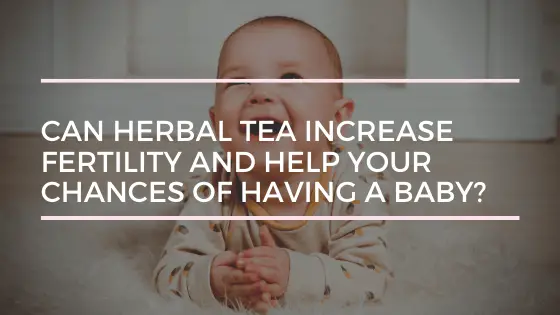Affiliate Disclosure – This post may contain affiliate links where we may receive compensation if you purchase products linked below. As an Amazon Associate, I can earn from qualifying purchases. This doesn’t cost you anything and helps keep our little blog running. Read our privacy policy for further information.
There’s been a rise in companies selling teas that suggest that by drinking the tea you’ll also increase your fertility and chances of conceiving a baby. This post explores whether herbal teas can increase fertility and whether they can help your chances of having a baby with help from scientists.
What is Fertility Tea?
Fertility teas come in various different forms so we’ll do our best to cover what we know is out there. We know that chamomile, raspberry and peppermint tea’s are the most popular when it comes to attempting to increase ones fertility based on readily accessible teas.
While there are also specifically designed teas designed to increase your fertlity. Some of these teas are thought to:
- Agnus castus – Balances hormones while also regulating periods.
- Nettle – Helps reduce inflammation and helps fertility.
- Raspberry leaf – Helps bring on labour, increases fertility while making periods more regular.
- Ladies mantle – Makes periods more regular.
And the list goes on…
What’s most important here is to consult with your doctor to to ask whether they are safe to drink before consuming. Like anything, we recommend only consuming these in moderation as too much of anything is never a good thing especially if you’re trying to fall pregnant or pregnant. Don’t trust an ‘expert’ on the internet who is only looking to sell something.
What Does Science Say About Fertility Tea?
From what we understand, most women begin trying fertility tea around 3 months early before eventually conceiving. Once they start taking the tea, how effective is it exactly?
Medical experts say there’s still a lot we don’t know about the effects of herbal products during pregnancy and at this stage, it’s too unclear to whether they do have an impact on pregnancy or not.
Based on the above, we’d recommend approaching fertility tea open minded and trying not to get too sucked in to the clever marketing employed by some companies. Instead, we think there’s better options like we discuss in the next section.
What Should I Do Instead of Taking Fertility Tea?
Seek Medical Advice
If you’re having trouble conceiving and concerned about your fertility rate, we recommend seeing a medical fertility professional and getting yourself properly checked out. They are best positioned to help understand what’s properly going on in your body while helping you work out a plan B rather than relying on some magic teas.
You may find that a fertility expert recommends you to get texted follicle-stimulating hormone (FSH) on day three of your cycle, getting an antral follicle count by ultrasound and an anti-mullerian hormone (AMH) test which all help diagnose how many eggs you may have which in turn, helps identify what your chances are of getting pregnant.
Get Fit and Healthy (Without Overdoing it)
A big part of having an good level of ovulation can depend on your body mass index. It’s thought that some women are unable to ovulate if they are considerably below their BMI while women considerably over their BMI can suffer the same fate of not being able to properly ovulate.
Avoid Lubricant
Some lubricants can contain something that’s known as spermicide which can affect sperm from doing its thing. There’s not many lubricants on the market that don’t have this effect but ‘Pre-Seed Fertiltiy-Friendly Personal Lubricant’ is the one you’re after.
Closing / Summary
We hope this brief article into whether herbal teas can increase fertility has been useful for you. Sorry to be the bearer of bad news but we’re on the fence to how effective they truly are and would recommend seeking other routes like we’ve mentioned above by seeing a medical professional and getting healthy are much better options for anyone that’s looking to increase their fertility and fall pregnant.
Good luck and thanks for reading!
Affiliate Disclosure – This post may contain affiliate links where we may receive compensation if you purchase products linked below. As an Amazon Associate, I can earn from qualifying purchases. This doesn’t cost you anything and helps keep our little blog running. Read our privacy policy for further information.

My name’s Alex and I’m a husband, dad to beautiful identical twin boys, cyclist, photographer and connoisseur of great coffee!
Help I’m Having Twins has been created for me to share what I found useful as a new parent and dad to twins.
